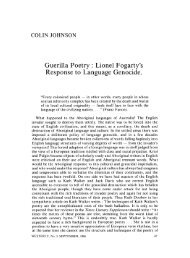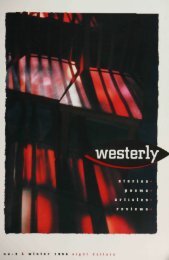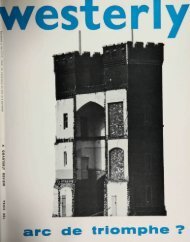Create successful ePaper yourself
Turn your PDF publications into a flip-book with our unique Google optimized e-Paper software.
G. C. BoltonAUSTRALIA'S BOOK OF KINGSKings in Grass Castles, Mary Durack, CorgiBooks, 1967, $1.15.Now that Kings in Grass Castles has becomea paperback—published, it appears, somewhatdisconcertingly in the same series as KingKong, Sexual Life in England, and MickeySpillane's Bloody Sunrise—it is worth investigatingthe reasons for the wide success ofMary Durack's history of her family. For shehas been one of the few Australian writers ofnon-fiction—Chester Wilmot and Alan Mooreheadare the only others who spring immediatelyto mind—to please both the book-readingsection of the general public and the professionalacademic. Kings in Grass Castles hasnot only been well received in itself; it hasformed the basis for a children's story, ToRide a Fine Horse, and even passed intomodern folklore as the basis of a joke—theone about the Ghanaian chief who concealedhis stool of office in the thatched roof of hishut, and was killed when the roof collapsed,which only goes to show that kings in grasscastles shouldn't stow thrones.Many of its qualities are obvious. Settingaside the devoted research and narrative skillof Mary Durack, the very materials of herfamily story could hardly fail to be interesting.That vigorous clan of Duracks touched manydominant themes in Australian legend and history:the two great eras of overlanding first toQueensland and then to the Kimberleys; thegold rush trail from the Turon to Hall's Creek;the land boom of the eighties; and, of course,the impact of the Irish in Australia. Given allthese ingredients, one is still rather impressedby the enthusiastic reception for Kings inGrass Castles. It has commanded supportamong English critics who were inclined tosuperciliousness over the crudities of pioneeringlife as described in Keep Him My Country—which I think is still somewhat under-rated.Even within Australia, however, Kings in GrassCastles was published about the same time asa number of other books on pioneering famihes,perhaps inevitably challenging comparisonwith Judith Wright's Generations of Men. Itwould be inept and pointless to compare theliterary qualities of the two works, but I mustown a preference for Patrick Durack overAlbert Wright simply as a central subject fora book. Perhaps it is just that, as a study ofa sensitive and sanguine man defeated by hisenvironment, Albert Wright calls to mind toofaithfully the themes already explored by TheFortunes of Richard Mahoney. Perhaps it issimply that my professional pedantry as ahistorian is nettled by a certain vagueness inJudith Wright towards details of time andplace.Patrick Durack, on the other hand, energeticand extrovert where Albert Wright was solitaryand self-questioning, gifted with a simple Connaughtfluency which still comes alive fromhis printed letters, may have been a less subtlecharacter, but he was one whose career illuminatesa number of central themes and problemsin Australian history. Perhaps this is why hislife story has appeal on so many levels. Howdifferent he was, for instance, from that equallyclannish, eloquent, hardy and enterprising limbof the Irish, Ned Kelly. How can we possiblygeneralise about the Irish in Australia when,from their almost identical starting-pointsamong tightly-knit communities of battlingIrish smallholders, the one around Goulburnand the other from back of Mansfield, theDuracks and the Kellys went on to such differentdestinies? Ned Kelly's life may have beenblighted by his father's convict origins, but thiswas a second-hand influence compared to thesearing famine of 1846 which Patrick Duracklived through as a twelve-year-old.WESTERLY, No. 1, MARCH, 1968 57







